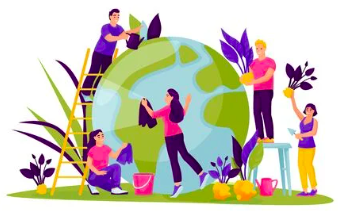Career Services Blog
Pro Bono & Community Service Work: Why Do It (And How)?
Open gallery

By Jessica Peterson, Assistant Director of Career Services
With the 2022 Pro Bono & Community Service Fair right around the corner, now is a great time to think about what you are passionate about and how you want to dedicate yourself to it. Participating organizations are holding 30-minute, virtual information sessions about their opportunities during the week of September 19-23. To see a list of all sessions and learn more about each one, go to Events on Career Connect and search for “Pro Bono & Community Service Fair.”
However, with the semester in full swing, you may also wonder how on earth you will be able to spare any time and energy to anything other than your coursework - and volunteering is the furthest thing from your mind.
Fair enough, but here’s a reframe: considering all of the incredible benefits of volunteering as a law student (and beyond, during the entirety of your legal career), maybe you can’t afford not to spare some time on a cause you love. What are some of these benefits?
- Apply and develop your skills in real-life scenarios. If there are any skills that you want more practice in, spending some time doing pro bono or community service work can help you get that practice. Whether it’s research, general people skills, taking diligent notes, advocating on behalf of someone or something, maintaining fluency in a second language, or any number of other things, practical experience via volunteering can help you polish the foundational skills used frequently in legal work.
-
Network. If there is a cause you care deeply about and want to meet like-minded professionals already doing work in that area, volunteering is a perfect way to do so.
- Low-risk way to explore new areas of law. Even if you already have a practice area in mind, or even feel totally committed to a certain specialty, it is always beneficial to keep exploring. If you’re curious about a different area and want to diversify your experience, pro bono work in that area may be exactly what you’re looking for.
- Increased employability. Actions speak louder than words. Rather than telling a potential employer what you care about, doing volunteer work speaks for itself. It says that you are dedicated to and passionate about something. It also says that you are able to manage multiple commitments and responsibilities.
- Experience in your desired practice area in a personal, and sometimes non-legal, context. Sometimes being immersed in schoolwork and academia can disconnect you from the things you care about most– including the very reason you decided to pursue law in the first place. Doing community service work related to that area can keep your feet on the ground, as well as personalize and humanize the work for you. And hey, it’s always nice to catch a break from schoolwork; spending time doing something that enriches your work is a huge bonus.
- Make a difference. Certainly not least of all, contributing to the ripple effect of positive change in the world is an amazing feeling. And there’s science to back this up, too– according to the Mayo Clinic, “Volunteering reduces stress and increases positive, relaxed feelings by releasing dopamine. By spending time in service to others, volunteers report feeling a sense of meaning and appreciation, both given and received, which can have a stress-reducing effect.” Stress-reducing effects during law school? Yes, please.
Depending on your unique situation and where you’re at in your journey as a law student, there may be additional benefits for you as well. For example, if you’re a 1L, volunteering is a way to gain valuable experience at a time when you are considered a bit too new to the legal world for paid positions. Evening law students who have a day job can volunteer to get a feel for where the rubber meets the road without giving up their current responsibilities. If you’re keen to to work for a particular organization, volunteering with them can be a way to get early information about their hiring practices and job openings.
Finally, there are benefits that are specific to the law school community. Reporting 30 hours of pro bono or community service work earns you either the Pro Bono Honors Award or the Community Service Honors Award. With 50 hours of pro bono work, and meeting other requirements, you earn the Public Interest Certificate! More information about these programs can be found HERE. Performing volunteer and pro bono work can even offer you a chance at receiving funding for your law school education through the Public Interest Law Project.
By now you’re probably thinking, “Sign me up! I’m completely and utterly convinced that doing pro bono and community service work is one of the best things I can do to enrich my law school experience.” Fantastic! Your Career Services team is eagerly waiting to help you find opportunities to volunteer.
For more information about the Pro Bono & Community Service Fair, keep an eye out for updates in your inbox in the days leading up to the fair, and send us an email at lscs@lclark.edu with any questions.
Can’t make it to any of the sessions, but still want assistance finding volunteer opportunities? Check out this page for a list of ways to find organizations.
Special thank you to Lexie Zirschky, Director of Equity, Inclusion & Academic Resources, for offering insight and expertise that assisted in the writing of this post.
Law Career Services is located in Gantenbein on the Law Campus.
MSC: 51
email lscs@lclark.edu
voice 503-768-6608
Law Career Services
Lewis & Clark Law School
10101 S. Terwilliger Boulevard MSC 51
Portland OR 97219